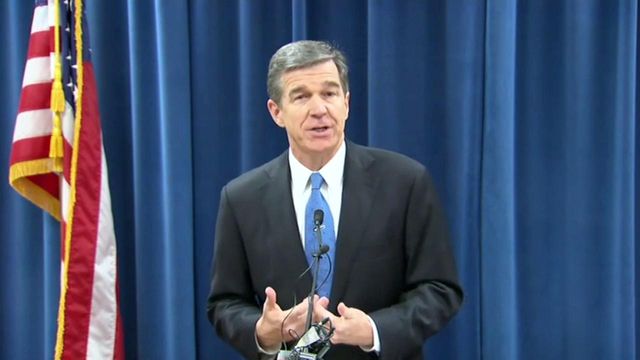Cooper: GOP proposals 'more ominous' than power grab
Gov.-elect Roy Cooper blasted Republican lawmakers Thursday for trying to push through legislation stripping him of some powers before he takes office, threatening to sue the General Assembly if he deems any of the new proposals to be unconstitutional.
Posted — Updated"Most people might think this is a partisan power grab, but it's really more ominous," Cooper said at a news conference.
- It reduces the number of exempt positions under Cooper's supervision from 1,500 to 300. Exempt positions are those that a governor can hire or fire at will, either because they are managers or because their job is somewhat political in nature. Although former Gov. Bev Perdue had roughly 500 such positions under her control, GOP lawmakers gave Gov. Pat McCrory 1,500 to work with.
- It removes gubernatorial appointments to the boards of trustees that run each campus in the University of North Carolina system. Those appointments would be would be transferred to the General Assembly.
- It requires Senate confirmation for gubernatorial cabinet appointments. Although the state constitution allows this, the legislature hasn't exercised this power in recent memory.
Cooper said the proposal "is really about hurting public education, working families, state employees, health care and clean air and water."
Putting the legislative thumb on his appointments for the Revenue and Commerce departments would encourages more corporate tax cuts and loopholes, he said. Likewise, renewable energy efforts and rules for clean air and water would be hurt by requiring Senate approval of the environmental secretary, he said.
Other provisions of the bill would vest more power in the state education superintendent, which will soon be in Republican hands, and Cooper said that could promote more private school vouchers at the expense of public schools.
"We don't look great to the people of North Carolina or to the rest of the country when laws are passed hastily with little discussion in the middle of the night," he said.
He cited House Bill 2, the law limiting LGBT rights that lawmakers passed in a one-day emergency session in March, as an example of the damage created by last-minute legislating. Business expansions, concerts, athletic events and conventions have been moved out of North Carolina as a result of the law.
"I will use all of our tools ... to lead this state in the right direction," Cooper said, including possible litigation to overturn legislation.
"If I believe that laws passed by the legislature hurt working families and are unconstitutional, they will see me in court – and they don't have a very good track record there," he said.
Democrats have their own track record of partisan power grabs, said Dallas Woodhouse, the executive director of the state Republican Party.
"They're mad at what Republicans are doing, but they should remember they did it to us many many times," Woodhouse said, referring to efforts during former Gov. Jim Hunt's early administrations to purge state government of Republican appointees.
"You can like it, you can not like it, but I would say this is something that's been done through history," Woodhouse said. "Part of it is this is the result of divided government. This is the result of voters picking a strong Republican legislature and a Democrat governor by a fingernail."
Cooper said the proposed shifts in appointment power could create gridlock in state government, and the idea should be more fully discussed when lawmakers return in January for their 2017 session and not forced through before he takes office.
"They are major changes in North Carolina law. They deserve debate. They deserve deliberation. They deserve public input," he said.
Lawmakers misled the public, he said, by not letting the public know about their agenda before they returned to Raleigh Tuesday to pass a disaster aid package for Hurricane Matthew and mountain wildfire victims.
"It's time for them to go home," he said. "Let's stop this last-minute process that could really wind up hurting North Carolinians."
Bill moves to Senate
Democrats such as Rep. Chris Sgro, D-Guilford, said Republicans were rushing in "overhauling massive swaths of how state government operates" and should wait until the 2017 legislative session convenes next month to consider the measure.
"Vote in favor of this abuse of power and you will be remembered, at best, as a politician, but know that will forgo forever any claim that you are or ever were a servant of the public," said Rep. Grier Martin, D-Wake.
"If 1,000 (exempt) positions was good enough in 2012 and 1,500 positions was good enough in 2013, then explain to me why it needs to be 300 on Jan. 1, 2016," said Rep. Darren Jackson, D-Wake. "We all know the answer to that."
Rep. David Lewis, R-Harnett, said Gov. Pat McCrory didn't fill all of the 1,500 exempt positions that lawmakers gave him in 2013, so it was proper to revert back to levels of appointees seen during former Gov. Bev Perdue's administration.
Still, Jackson quoted a popular phrase among the GOP majority in recent years to respond to Democratic complaints: We won, you lost, get over it.
"Now the saying seems to be 'You won, we lost, get over it,'" he said.
Backers of the proposal countered that the General Assembly was merely reasserting legal control over appointments that lawmakers had delegated to governors for years.
"Anything we can do to restore a little bit of the authority to the legislature that they gave up, largely in the 1980s, is making a corrective action to partially rebalance what, I think, is a state government that's been way out of kilter," said Rep. Jeff Collins, R-Nash.
Even before the protests, members of the public balked at the plan.
"What is being done now is wrong," Wake County resident Brian Fitzsimmons told members of the House Rules Committee on Thursday morning. "This is not the way good and reasonable and honest people govern. ... We need to stop using this body as a means for our own desire to achieve greater power."
Education officials oppose bill
"(The bill) raises constitutional concerns and eliminates checks and balances that are important to the students of North Carolina," Cobey said in a statement. "The bill is not in the best interest of public schools and public charter schools in North Carolina."
"This has the potential to change the department from a nonpartisan agency to a partisan agency, and I find that troubling," said Atkinson, a Democrat who lost her re-election bid to Republican Mark Johnson. "I think (board members) are concerned about how the passage of this bill will affect the working relationship (with Johnson).
Lewis said that voters elect the state superintendent of education, so that person should be in charge of DPI, adding that was the arrangement up until lawmakers put more power with the State Board of Education in the 1990s.
"Bottom line, (the bill) treats the superintendent of public instruction with the same basic authority that we vest in the other heads of state agencies," he said.
Related Topics
• Credits
Copyright 2024 by Capitol Broadcasting Company. All rights reserved. This material may not be published, broadcast, rewritten or redistributed.






